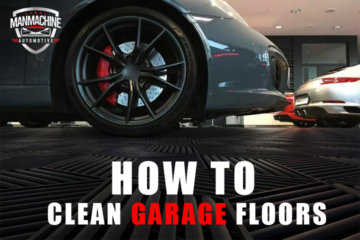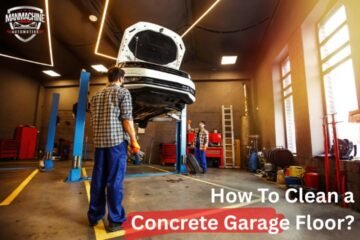Your garage floor takes a heavy daily workload from hot tires and oil spread to dropped equipment and heavy storage units, combined with abuse over time. Whether you have invested in epoxy, tiles, mats, or bare concrete, the correct garage flooring maintenance tips are the key to long life. With some smart habits and sometimes deep cleaning, you can keep the garage floor in top condition for years.
In this comprehensive blog, we will cover the best garage flooring maintenance tips, cleaning routines, cleaning tips for garage floors, damage prevention techniques, and care techniques for different types of garage floors.
Why Garage Floor Maintenance is Significant?
The garage floor is often ignored, with visible signs of damage such as spots, cracks, wear and tears. But it’s crucial to know how to maintain garage flooring constantly:
- The floor seems more professional and cleaner
- Slipping surfaces and tripping hazards are minimised
- Harmfulness from chemicals, road salts, and tire wear reduces
- The life of the floor expands for many years
Let’s explore the best maintenance practices corresponding to the top notes: epoxy, tiles, PVC mats, and bare/sealed concrete.
1. General Pointers on Garage Flooring Maintenance Tips
Despite the material, a few common recommendations have been applied to all garage floors:
Regular Sweeping and Dirt Control
- Sweep at least once a week to dispose of particles, dirt and grit.
- Use a soft-bristle broom or dirt mop for tiles and coated floors.
- For structured tiles or mats, a store with brushing is of the quality.
Wipes Spills Instantly
- Oil, brake fluid or chemicals can get into the seams and might stain.
- Keep rags, absorbent pads or kitty litter things handy for soaking up the spills quickly.
Use Mats and Runners at Entry Points
- Protect regions with excessive visitors and entrances with rubber mats or rugs.
- It reduces direct floor wear and decreases the dust brought by tires or shoes.
Prevent Hard Chemicals
- Leave bleach, ammonia or acidic cleaners.
- Instead, use a pH-neutral floor cleanser, especially made for garage flooring.
2. Epoxy Garage Floor Maintenance Tips
Epoxy is one of the most durable and visually appealing Garage Floor alternatives. However, it still requires maintenance to maintain its seamless, shine look.
Regular cleaning
- Mop each 2-four weeks using a microfiber mop with hot water and a smooth cleanser.
- Use diluted ammonia (2-3 grams consistent with a gallon of water) for deep cleaning.
- Vinegar or citrus-based cleaners should be avoided in order that the glow is slow.
Stain management
- Add oil or chemical spills instantly to prevent the discolouration effect.
- For dried spots, scrub gently with a soft nylon brush and a light detergent.
Stop tire marks and hot tire pick up
- Wait at least 7 days after the epoxy installation before driving on it.
- Use polyurethane tire mats to avoid hot tire pick-ups in the summer.
Additional garage flooring maintenance tips to protect from heavy influences
- Use rubber pads or plywood under heavy equipment and a jack stand.
- Avoid leaving the tool directly on the epoxy as it can damage or crack it.
3. Interlocking or Modular Tile Maintenance Tips
Garage tiles (PVC, polypropylene, or rubber-based) are popular for DIY upgrades. Their modular nature makes them easier to install, replace, and maintain.
Regular cleaning
- Swipe or vacuum grit weekly.
- Hose off the tiles after every few months, especially under cars.
Deep cleaning
- For heavy cleaning, remove the tiles and rinse.
- Use a non-abrasive brush with light soap and water.
- Allow the tiles to dry completely before reinstalling to avert mold.
Prevent debris between tiles
- Install tile ramps to reduce the dirt that is stuck.
- Use compressed air or a vacuum between the tile seams occasionally.
Change damaged tiles immediately
- One of the quotas for tiles is modularity; do not ignore a crack or loose tile.
- Change individual devices before damaging tiles nearby or creating hazards.
4. Garage Flooring Maintenance Tips for Mats – PVC or rubber roll
Roll mats and tiles provide a flexible, easy-to-install solution. But without proper maintenance, they can show shifts, wrinkles, or deterioration over time.
Weekly dusting and wiping off
- Use a vacuum or tassel to remove surface dirt.
- Lightly clean the plate with soap and water-founder-accelerated-based detergent.
Let the mats breathe
- Sometimes, pick up the mat and let the floor go down in the air.
- This helps prevent moisture in buildings, mold and mildew.
Secure the edges
- Use double-faced tape or glue to keep the edges in place.
- Trim excess mat in case of curling or wrinkles.
5. Concrete Floor Maintenance (sealed or bare)
Only bare concrete may be the most rugged, but it does stain and crack easily if left untreated. Even the sealed concrete needs some attention.
Seal it first
- If your floor is unsealed, do think of applying a penetrating concrete sealer.
- It protects towards moisture, chemical compounds and dust.
Regular maintenance
- Swipe often to lessen friction from grit and dust.
- Mop monthly with a concrete or mild soap solution.
Crack restore
- Fill minor cracks with a concrete crack filler or epoxy patch.
- Do not forget about cracks, as water may leak and damage it to an extend.
Common Mistakes to Prevent in Maintaining the Garage Floor
Knowing what isn’t always essential to do:
Using a power washer extremely
- High-pressure water can damage epoxy and tiles.
- Use gentle water pressure to rinse uncoated concrete.
To permit water to sit
- Pooled water can cause peeling (epoxy) or mold growth (beneath mats).
- Always dry the floor after washing.
Dragging a heavy gadget
- Lifting or rolling heavy gadgets as dragging, can scratch or gouge floor surfaces.
Recommended Cleaning Products for Garage Floors
Here are the best garage floor cleaners according to their type:
| Type | Recommended Cleaner | Notes |
| Epoxy | Basic Floor Cleaner | pH-neutral, non-abrasive |
| Tiles | Tile Cleaner | Avoid acid-based products |
| Mats | Mild Mat Cleaner | Test spot before full clean |
| Concrete | Specific Concrete Cleaner | Use only on sealed or bare concrete |
Always spot test cleaners first, specifically on coloured or decorative flooring.
Seasonal Maintenance Checklist
Here is the proper seasonal maintenance checklist as follows:
Winter
- Look for road salt – clean floors weekly.
- Use containment mats to seize snowmelt and slush.
Monsoon
- Provide the proper drainage close to the garage door.
- Check for mold or mildew beneath mats.
Summer
- Look for hot tire pickup on the epoxy floor.
- Clean the spilt motor fluid immediately after upkeep.
Fall
- Swipe time and again, such as dry leaves stain some floor types.
- Observe for developing cracks or wear.
Conclusion
No matter what type of garage floor you choose, frequent care is the secret to long-term performance and aesthetics. A dirty or damaged garage floor not only looks bad but can also be a safety threat. Form a daily sweeping routine to seal up the cracks and handle issues such as spills; these garage flooring maintenance tips can assist in keeping your floor showroom-ready.
Invest some time each month, and your garage floor will continue to look good and perform better and even no expensive repairs or replacements are required.
Bonus Tip: Do Plan a Seasonal Floor Audit
Take about 15 minutes to inspect it once each season:
- Surface Status (cracks, peeling or stains)
- Moisture levels (especially below the mats)
- Adhesion of floor tiles or coatings
- Cleanliness in corners and underneath shelving
This habit can help prevent minor problems with expensive repairs.
Do You Want a Garage Makeover?
If your current garage floor is beyond maintenance or you plan to upgrade your home garage, consider Manmachine Automotive Garage Flooring. It requires little maintenance and is produced for performance.
FAQS
Q1. How often do I need to smooth my garage floor?
Light cleaning should be done weekly, with a deep cleaning every 1-2 months, depending on the traffic and usage.
Q2. Can I use bleach to clean up my epoxy storage floors?
No. Bleach can dull the epoxy surfaces; therefore, you should stick to pH-neutral cleaners.
Q3. Is it okay to pressure wash my garage floor?
The pressure washer should only be used on bare or sealed concrete floors. For other floor types, use mild methods.
Q4. How do I fix stains on garage floors?
Raise the mat, clean with warm soapy water and a soft brush, and air dry properly before reusing.
Q5. What is the cause of the fast tire on the epoxy floor?
Even after application, running on epoxy or using an epoxy coating with lower grain can eliminate tire wear.
Q6. Can I process or repeat an epoxy floor?
Yes, after thoroughly cleaning and surface preparation. Rejuvenation expands life and renews brightness.



0 Comments